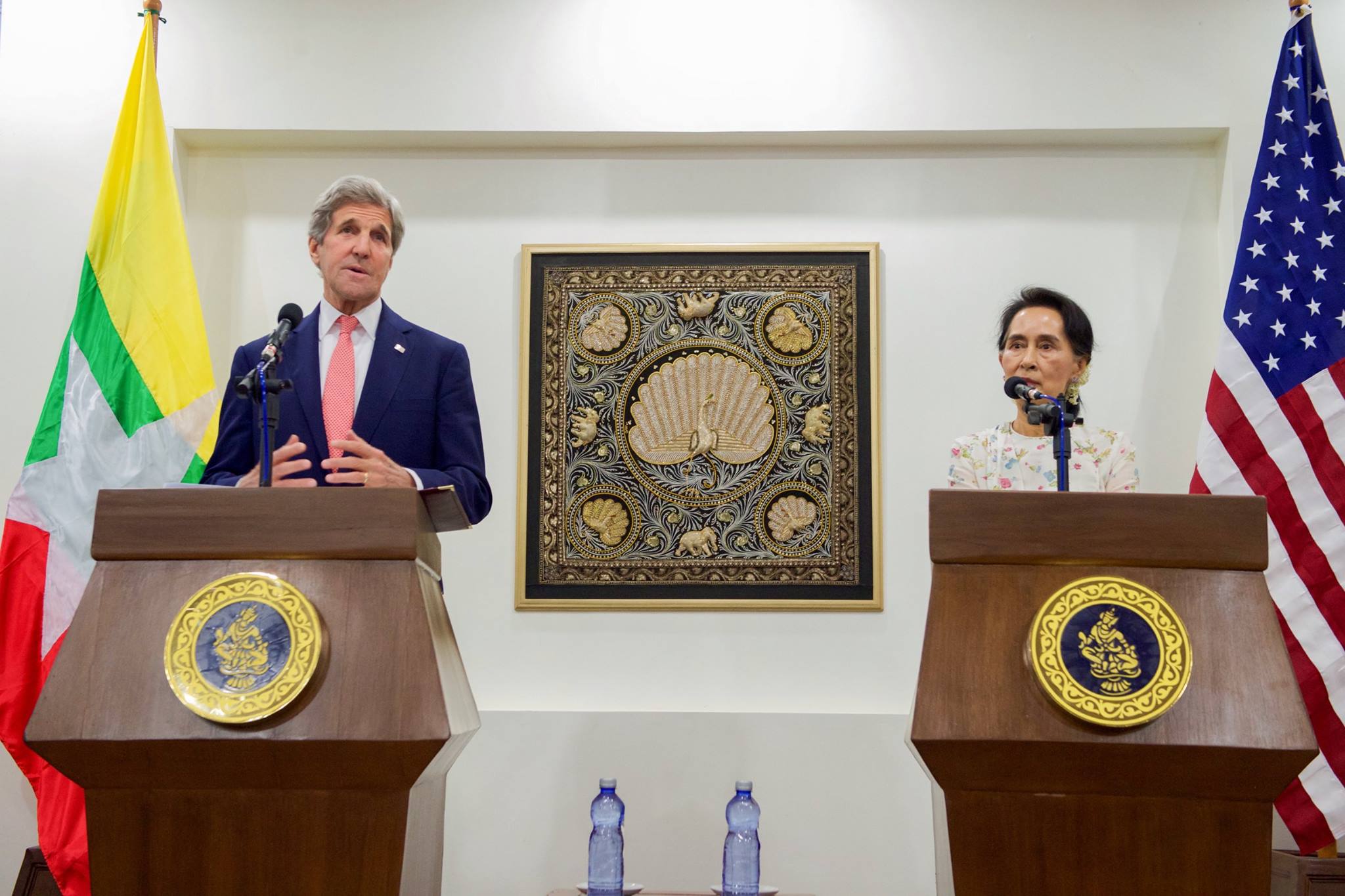Aung San Suu Kyi, Burma’s foreign minister and de facto leader, met with US Secretary of State John Kerry in the country’s new capital on Sunday, cementing ties with the promise of completing what has been a trying transition from dictatorship to democracy.
“Today my message is very, very simple,” Kerry told a small roomful of reporters in Naypyidaw, following his first meeting with Suu Kyi since her party took power in early April. “We strongly support the democratic transition that is taking place here.”
Kerry recalled his first visit to Burma some 17 years ago, when he was still a senator and Suu Kyi was under intense scrutiny by the then-ruling military junta. At the time, Kerry said, the regime tried to convince him that the people of Burma favored order over freedom.
“Time and again,” the secretary said, “the Burmese people risked their lives in order to prove that theory was wrong.”
Suu Kyi’s National League for Democracy (NLD) swept into power following a landslide election win last November. Her new government — the first freely elected in Burma since the military seized power in 1962 — faces a host of problems, including ethnic conflicts, a growing drug crisis, and widespread poverty despite the country’s abundance of natural resources.
At Sunday’s meeting, however, the focus was largely on economic issues; Kerry’s visit came just days after the United States eased its sanctions regime on the country, lifting restrictions on a number of financial institutions and other state-owned enterprises.
The US Treasury also maintains a targeted list of specially designated nationals, which Kerry said is intended to “leverage certain individuals and certain sectors” to contribute more to the country’s democratic progress.
For her part, Suu Kyi expressed confidence that the sanctions wouldn’t be around forever.
“We are not afraid of sanctions, we are not afraid of scrutiny,” she said, welcoming the updates without pushing for more immediate relief. “We believe that if we are going along the right path, all sanctions should be lifted in good time.”
Removal of remaining sanctions will require further reforms, Kerry said, including changes to a military-drafted constitution that safeguards the political power of Burma’s armed forces. The current charter, which grants the military an assortment of cabinet positions, a quarter of parliament and veto power over amendments, “needs to be changed”, he said.
Another issue that has strained relations with Washington was also raised on Sunday — Burma’s official stance on the Rohingya, a Muslim minority largely confined to Arakan State, where more than 100,000 have been forced into displacement camps since communal riots that first broke out in 2012.
Suu Kyi has come under criticism over her recent suggestion that US Ambassador to Burma Scot Marciel refrain from using the word “Rohingya” in the wake of protests by nationalists in front of the US embassy in Rangoon late last month. Many Burmese reject the term, referring to the Rohingya instead as “Bengalis”, implying that they are illegal immigrants from neighbouring Bangladesh.
[related]
Suu Kyi defended her remarks, claiming that she meant for diplomats to avoid “any terms that could just add fuel to the fire”, as it would just complicate her government’s response to the immediate humanitarian crisis.
“The reason why I said that we’ve got to be very firm about not using emotive terms is because emotive terms make it very difficult for us to find a peaceful and sensible resolution of our problems,” she said, adding that “we will try to do the best we can to resolve the problem, to the benefit of both communities.”
Kerry ended his brief visit on Sunday evening after meeting with military Commander-in-Chief Senior General Min Aung Hlaing. He will join US President Barack Obama in Vietnam, as the outgoing chief rounds out his term by firming up ties throughout the Asia Pacific region.



